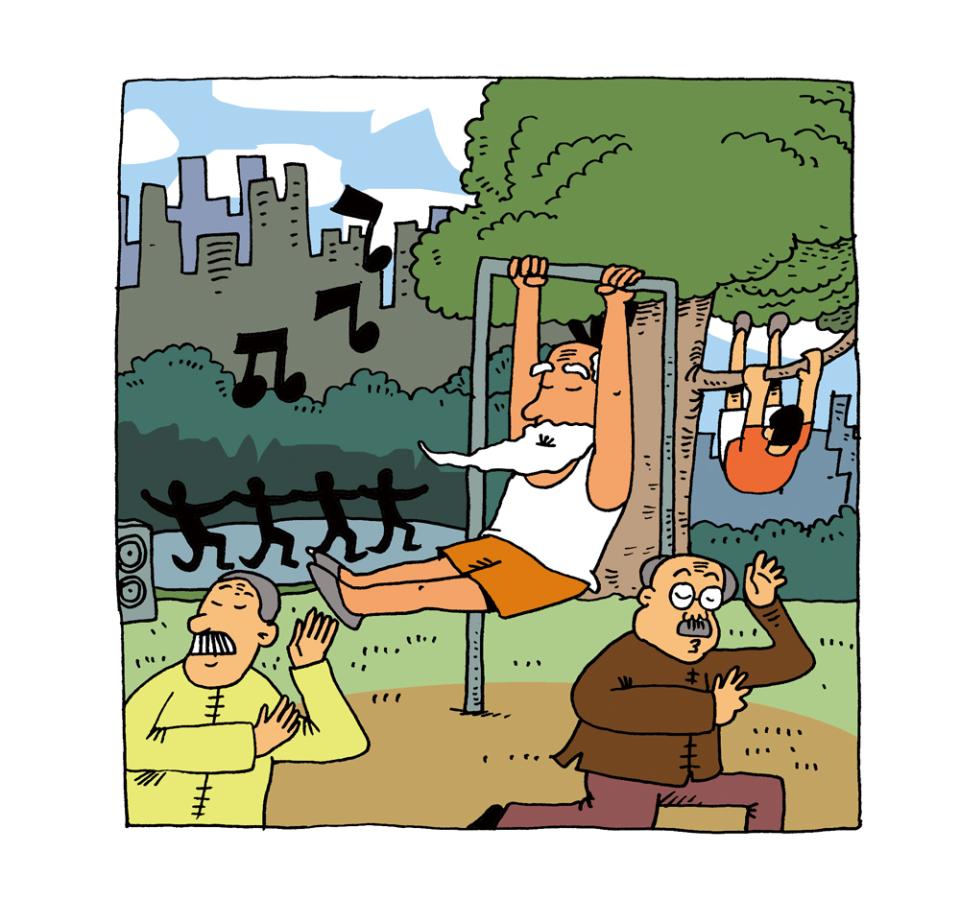A Chinese friend once told me about the time she accompanied a group of officials to Montreal, Canada. Finding themselves with a spare few hours one sunny afternoon, they asked their bus driver if he could take them to a park. He drove them to a beautiful nature reserve near the city, but within a few minutes, the group asked to leave. It wasn’t their idea of a park. It had no amusements, no boating, no unidentifiable meat being sold on sticks. There was too much nature, and not enough fun.
As an Englishwoman, I love parks. In the UK, towns and cities across the country pride themselves on their public parks, which are free to all, and usually have wide expanses of grass, plus trees and plants. Yes, some do have playgrounds for kids, or sports facilities in them, but generally only in one corner.
People in China experience parks in a very different way. Many parks in cities here still use the elements of classical Chinese gardens, so you will find lakes, rockeries, hidden corners, bridges and pavilions – but any grass is strictly for ornament, not for play. I still like these parks, especially the way local people commandeer every inch of open space they can to do activities from dancing to kite-flying. But it does mean a visit to a park on a weekend or holiday is more of an obstacle course than a relaxing time.
I recently took up running, and on days when the pollution and humidity are low enough, I go to a local park that has a running track around a rather large lake. In the afternoons, there is the usual crew of elderly walking and running around, plus some extremely tough retirees who can contort their bodies into positions that I never could, even as a child. It gives you pause when you are huffing and puffing around to realize that these 70-year-olds can do chin-ups and still raise their legs above their heads. Still, most of them are doing more gentle exercise, such as walking backwards and hugging trees.
I once went to this park on a Friday evening for a run. It was a big mistake. First, in my foreign way, I was apparently running in the wrong direction to everyone else – which didn’t matter in the daytime, but this night, it was like trying to plow through a zombie horde. Then there were these crazy loud techno dance parties and strange circus-like performances. I decided evening running was out. But last time I went there, after a summer break from running, I discovered to my dismay that the whole lake had been emptied and was full of digging equipment, workers and their tents. It seemed more than just a lake clear-up; very obviously, the workers were building stone dams and were filling them, nibbling away at the edges of the lake just where the running track is. I had always found it restful while running to look at the water, especially on a sunny day. It makes for a break from the relentless gray of urban buildings. Now I fear that this park is going to become just as noisy in the daytime as at night – with restaurants and karaoke bars and amusements, not extra trees or grass where kids might kick a ball around.
Still, it isn’t easy to find cheap or free places for entertainment in a big city like Beijing, and I can’t begrudge the local people from doing activities that they enjoy, even if they are done at ear-splitting volumes. Some local people have started to push back against the scourge of the dancing aunties on street corners and squares. They perform their ‘square dancing��� routines, sometimes en masse in groups numbering in the hundreds – and their nightly boogie is not quiet. Local residents complain, and sometimes there’s been violent protests, with locals throwing water and even worse at the aunties. Other cities have designated quiet zones, or limit the dancing to certain times.
But I’ve always liked the dancing aunties–as far as I’m concerned, the more the better, just as long as it’s not too early in the morning. Years ago, when I worked as a tour guide, taking Brits and Americans around China, we used to make a trip out of going to see them. In Chongqing’s People’s Square, every night, over 1,000 people came to dance along to musical fountains, and in Luoyang, every part of the rectangular Peony Square is alive after dinner with all kinds of activities – from ballroom dancers in a boxing ring, to kung fu practitioners, opera singers and many more, all of whom were delighted to have a foreign audience and to invite them to join in.
But the best was always the Temple of Heaven in Beijing, the place I always took tourists to the first morning after arrival. Up until then, their view of China would be fairly nondescript high rises from a traffic jam, but they were captivated by the sight of hordes of aunties – and uncles – exercising, singing, knitting, playing musical instruments, doing tai chi, and of course dancing in the park.

 Old Version
Old Version